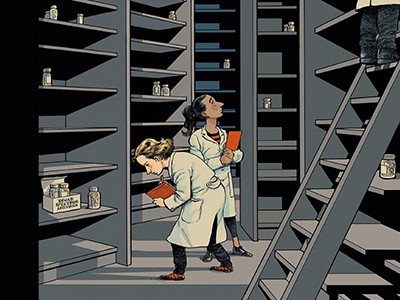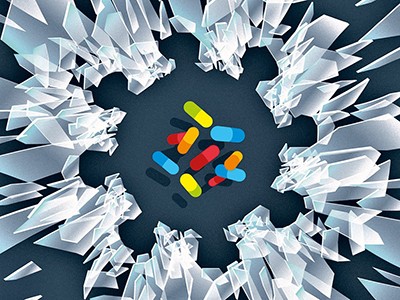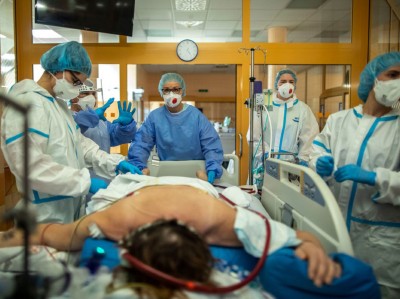Ewen Callaway reports in Nature:
A dozen or so genetic variants have a strong statistical association with a person’s chances of developing COVID-19 and becoming gravely ill with the disease. “There were actually quite a few very common genetic variants that were really important in COVID-19.” A variant that leads to lower circulating levels of the OAS1 enzyme in the lungs increases risk of infection, hospitalization and critical illness. The findings shed light on biological mechanisms of the disease, and suggest which drugs to test.Since last March, research teams around the world have scoured the genomes of more than 100,000 people with COVID-19, hoping to find genetic clues to who will be hit hardest by an infection with the virus SARS-CoV-2. What’s emerged from this effort is a dozen or so genetic variants that have a strong statistical association with a person’s chances of developing COVID-19 and becoming gravely ill with the disease, the teams report in a summary analysis published on 8 July in Nature1.
“There were actually quite a few very common genetic variants that were really important in COVID-19,” says Guillaume Butler-Laporte, an infectious-disease physician and genetic epidemiologist at McGill University in Montreal, Canada. “I don’t think we expected to find them so clearly.”
The loosely aligned teams involved in the analysis include both academic laboratories and private firms such as the US companies 23andMe and AncestryDNA, and have been releasing their work steadily over the past year. Known collectively as the COVID-19 Host Genetics Initiative (HGI), they first posted their summary — an amalgamation of 46 separate studies covering, at the time of analysis, almost 50,000 people with COVID-19 — on the medRxiv preprint server in March.
The genetic associations they found increase risk by a relatively small amount, although some of the rises are comparable to those for risk factors such as obesity, diabetes and other underlying health conditions (see ‘Genetic variants that change COVID-19 risk’).
GENETIC VARIANTS THAT CHANGE COVID-19 RISK
The Host Genetics Initiative has found more than a dozen areas of the genome that are statistically associated with susceptibilities to SARS-CoV-2 infection or severe illness.
Clinical effect
Effect on risk (% increase)*
Possible genetic link
Chromosome
Susceptibility
4–8
Unclear
19
Susceptibility
5–8
Unclear
3
Susceptibility
9–12
ABO (determines blood group)
9
Susceptibility
13–18
SLC6A20 (interacts with ACE2 receptor, which mediates SARS-CoV-2 entry)
3
Severity
9–18
Unclear
17
Severity
13–20
IFNAR1/2 (part of cell receptor for interferon, proteins that bolster immune response)
21
Severity
14–26
OAS family (enzymes that digest viral RNA)
12
Severity
17–36
FOXP4 (involved in lung diseases)
6
Severity
20–32
DPP9 (enzyme involved in lung disease)
19
Severity
24–52
Unclear
8
Severity
28–64
Unclear
17
Severity
29–59
TYK2 (enzyme involved in interferon signalling)
19
Severity
56–74
Unclear
3
But the findings can shed light on biological mechanisms of the disease, and suggest which drugs to test, says Kenneth Baillie, an intensive-care physician and a geneticist at the University of Edinburgh, UK. In other research, scientists have also picked out rare genetic mutations — in contrast to the relatively common variants listed in the latest HGI study — that might also explain the root causes of severe disease.
Not everyone is convinced that the genetic work gives immediate insight. “We’re starting to get a pretty good genetic map,” says Julian Knight, a human geneticist at the University of Oxford, UK. “To move that on to where we’ve got good drug targets or an understanding of disease variability, that’s going to be a big step.” This, he says, is a typical issue for research that tries to link common variations in genomes with people’s risk of complex diseases.
And Kári Stefánsson, chief executive of deCODE Genetics in Reykjavik and a member of the HGI, doesn’t feel that the work to find genetic ‘hits’ has been especially fruitful — at least so far. Still, Stefánsson says, “I think it’s extremely important to follow as many of these as possible. You may be able to find a mechanism of major importance.”
Although geneticists don’t yet have all the answers, they’ve moved extremely rapidly to unpick associations with COVID-19, says Brent Richards, a geneticist and endocrinologist at McGill University who is part of the HGI. “The human-genetics community hasn’t slept much this year,” he says.
Genetic hits for COVID-19
The HGI worked less like a consortium focused on a single unifying project, and more as a clearing house for collaborations, support and advice. Teams were free to publish their own studies, while contributing to pooled studies that combined individual efforts. “It was just a matter of creating a place that people would feel comfortable together, and work together,” says Andrea Ganna, a statistical geneticist who co-founded the HGI with geneticist Mark Daly; both are at the University of Helsinki and the Broad Institute in Cambridge, Massachusetts.
Ganna is a specialist in genome-wide association studies (GWAS) — the bread and butter of genetic epidemiology. These examine hundreds of thousands of relatively common single-letter DNA differences across the genome in large numbers of people, to see whether any are enriched in people with a particular disease or trait. It was inevitable that people would apply GWAS to COVID-19, Ganna says.
One genomic variant identified by Baillie’s team and confirmed in other HGI efforts is near a family of antiviral genes called OAS (oligoadenylate synthase). The genes activate enzymes that chew up viral RNA, and HGI studies1,2 show that a variant that leads to lower circulating levels of the OAS1 enzyme in the lungs increases risk of infection, hospitalization and critical illness. Most coronaviruses counteract this protection using proteins called PDEs, or phosphodiesterases, but SARS-CoV-2 doesn’t make PDEs. “So this might provide an Achilles heel,” explains Richards, who is aware of pharmaceutical companies that are pursuing the target, but declines to reveal details. On the basis of the genetic association, drugs known as phosphodiesterase 12 inhibitors are predicted to boost natural antiviral defences, Baillie says.
Another variant spotted by Baillie’s team and confirmed in other COVID-19 GWAS is near a gene that encodes a portion of a cellular receptor for molecules called interferons1, which are well known for boosting people’s immune responses to viruses. Because of this antiviral role, one kind of interferon molecule had already been tested in trials, before the genetic association came to light. It was one of the first drugs included in the World Health Organization-sponsored ‘Solidarity’ trial of COVID-19 treatments, but didn’t help patients. It’s possible that the genetic prediction was wrong, Baillie says, but it could be that interferon needs to be administered earlier in infection, or in a different manner to the subcutaneous or intravenous injections that Solidarity trial participants received.
Baillie also says that other genetic associations are now being used to prioritize treatments. One example is in the widely praised UK-based RECOVERY trial, which most famously showed the benefit of a common steroid for people with severe COVID-193. The trial is using genetic data to help select drugs to test — including a rheumatoid arthritis drug called baricitinib and a treatment for psoriasis and multiple sclerosis called dimethyl fumarate, says Baillie, who is part of the effort.
Baricitinib inhibits the protein encoded by a gene, TYK2, that was associated with life-threatening COVID-192. The relationship between TYK2 activity and risk of severe COVID-19 isn’t clear-cut from the genetic studies, “but it did provide a big extra source of support for the idea”, says Baillie. Dimethyl fumarate was included largely for its known role in quelling an inflammatory process involved in severe COVID-19, but genetic links provided added support for testing it in RECOVERY, says Baillie.
GWAS, however, also have a reputation for delivering head-scratching results. That has happened with COVID-19, too: the strongest association between any gene variant and severe COVID-19 lies in a poorly studied region of chromosome 31. “We still don’t quite know, as a scientific community, why it’s so important,” says Butler-Laporte. The chromosome 3 region includes several genes involved in immune signalling, lung biology and other plausible mechanisms. But it’s not clear which of these genes explains the association with COVID-19.
People who carry this gene variant are around twice as likely as others to be hospitalized with COVID-19. A study4 led by Richards, Ganna and Tomoko Nakanishi, a geneticist and respiratory physician at McGill, found that the variant raises the odds of people aged 60 or under becoming critically ill or dying from COVID-19 as much as and perhaps even more than risk factors including diabetes, obesity and chronic obstructive pulmonary disease.
Risk scores
As a result of such associations, some researchers are exploring whether the genetic links turned up in GWAS could be used to predict an individual’s risk of a life-threatening SARS-CoV-2 infection. Risk scores, which amalgamate associations discovered in GWAS, have been used to measure an individual’s risk of conditions such as type 2 diabetes, various cancers and cardiovascular disease.
But it’s not clear whether this approach could work for COVID-19 — or is even needed, given the availability of vaccines. In June, a firm in Fitzroy, Australia, called Genetic Technologies launched a US$175 test to predict people’s risk of developing severe COVID-19. But it also relies on age, sex and health, all factors that significantly improve the predictive power of the GWAS associations5.
Chief scientific officer Richard Allman says that the firm’s test, which was developed and validated using data from the UK Biobank database, might be most useful for middle-aged people. Most will have a relatively small risk of severe COVID-19, but the test could identify those rare individuals with vastly increased (or dramatically reduced) chances of developing a life-threatening infection. The firm’s test is currently available only in the United States, through a company called Infinity BiologiX in Piscataway, New Jersey, and with consultation from a health professional. Still, Genetic Technologies is in talks with companies interested in offering the test to employees, says Allman, who says he does not have sales figures.
Nakanishi, Richards and Ganna say that it’s not clear whether the test has been validated enough to be reliable, but that that doesn’t mean such tests couldn’t be useful as another motivation for higher-risk people to get vaccinated. “It might get a few people over the edge who are worried [about vaccination],” adds Genetic Technologies biostatistician Gillian Dite.
Genetic studies of COVID-19 — like those of most other diseases — have overwhelmingly been based on people with European ancestry. That’s a problem, says Knight, because of the global burden of COVID-19 and elevated rates of disease in minority ethnic groups in countries such as the United States and United Kingdom. “We really need to make the investment in genetics in those populations.”
Diversifying genetic studies can not only improve understanding of risk variants identified in European populations, but also identify new ones in other groups. A GWAS that included more than 2,000 people hospitalized with COVID-19 in Japan6 identified many of the variants flagged by studies of European populations, as well as an immune gene, called DOCK2, with a role in interferon production that hadn’t come up in other studies. The DOCK2 variant that increased COVID-19 risk was relatively common in East Asians, but very rare in people of European, South Asian and African ancestry. “This tells us the importance of increasing diversity in host genetics of COVID-19,” says study leader Yukinori Okada, a statistical geneticist at Osaka University in Japan.
Rare mutations
Some researchers feel that the GWAS approach, which has found common variants that raise an individual’s risk only by a small amount, is less fruitful than spotting much rarer mutations that might explain why some otherwise healthy people are in intensive care with COVID-19.
That’s the view of Jean-Laurent Casanova, a geneticist at the Rockefeller University in New York City. He co-leads a consortium called the COVID Human Genetic Effort, which in September 2020 reported7 spotting mutations in people with severe COVID-19 that disable genes involved in a potent antiviral response, called type 1 interferon immunity. (One of the genes in which they found mutations, IFNAR2, which codes for a subunit of an interferon receptor, has also been flagged by multiple GWAS.) The mutations identified by Casanova’s team were rare, but in a follow-up study8, the researchers found that 10% of people with life-threatening COVID-19 produced antibodies that inactivate type 1 interferons — mimicking the effects of the gene mutations. Casanova says his team looked for them only after they identified the genetic mutations, underscoring the power of his approach to point to new lines of research. “Essentially what we’ve cracked is a mechanism of critical COVID-19 pneumonia,” he says.
Rare mutations with profound consequences are “a great torch to use” to uncover disease mechanisms, says Akiko Iwasaki, an immunologist at Yale University in New Haven, Connecticut, whose team is studying the role of ‘autoantibodies’, which attack the body’s own immune defences, in severe COVID-19. The effects of common variants identified in GWAS might be subtler, she adds, but the unbiased way in which they are identified means that the hits can give credence to insights from other disciplines, such as immunology. “It’s explaining some of the things we’re seeing,” she says. “I love that aspect of it.”
Richards is part of a team that is trying to replicate Casanova’s genetic finding, without success so far. He and his colleagues found that mutations in 13 type-1 interferon genes were no more common in nearly 2,000 people with COVID-19 than in controls not known to have been infected9, echoing the conclusions of an analysis led by researchers at the biotechnology firm Regeneron in Tarrytown, New York, who looked at protein-coding genes in more than half a million UK Biobank participants10. This doesn’t mean that the type 1 interferon pathways are not important, Richards says, and he agrees that the autoantibody connection looks promising.
Alessandra Renieri, a geneticist at the University of Siena, Italy, and an early member of the HGI, says that GWAS findings need to be integrated with links to rare variants and other forms of genetic diversity if researchers are to fully understand COVID-19 susceptibility, and to come up with treatments. She is part of a team that has applied for permission from Italian regulators to test therapies based on genetic findings.
For instance, the team wants to test an adjuvant (which awakens the immune system) in people with rare mutations that disable a virus-detecting gene called TLR7, which might be connected to severe COVID-1911. It also wants to test whether the hormone testosterone might be able to prevent life-threatening COVID-19 in men with a common variation in a gene that encodes a receptor for the hormone, after finding a link between severe COVID-19 and gene variants associated with reduced levels of testosterone circulating in the blood12.
The success of such trials should not be the only metric by which to judge the fruits of genetic studies into COVID-19, say researchers. Other biologists are drawing on the genetic studies to help make sense of their own experiments on the virus. And puzzling associations such as the chromosome 3 link could reveal important insights that help in treating COVID-19 — and whatever disease is caused by the next new coronavirus.
Each new genetic finding is like a piece of a puzzle, Renieri says. “Several pieces are coming together. I’m sure that the picture will be much more clear in the very near future.”






















0 comments:
Post a Comment